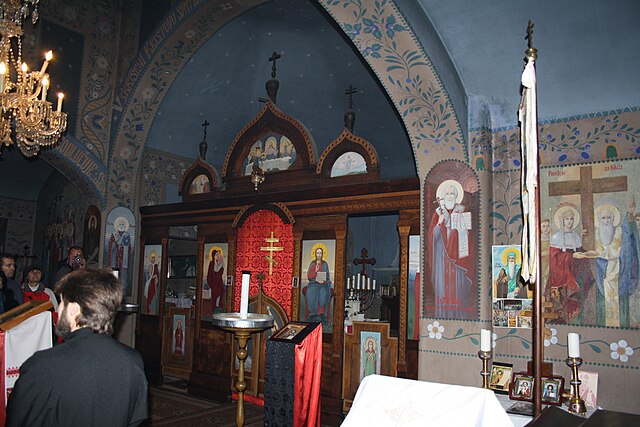Great Lent: Difference between revisions - Wikipedia
 Article Images
Article Images
m
(14 intermediate revisions by 10 users not shown)Line 1:
{{Short description|Observance in Eastern Christianity}}
{{More citations needed|date=April 2008}}
[[File:Altar of orthodox Church of saint Wenceslaw and Saint Ludmila in Třebíč, Třebíč District.jpg|thumb|250px|An Orthodox church in the Czech Republic [[antipendia|vested]] in [[liturgical colors|lenten colors]].]]▼
{{Eastern Orthodox sidebar|expanded=calendar}}
{{Liturgical year}}
'''Great Lent''', or the '''Great Fast''' ([[Greek language|Greek]]: Μεγάλη Τεσσαρακοστή, ''Megali Tessarakosti'' or Μεγάλη Νηστεία, ''Megali Nisteia'', meaning "Great 40 Days", and "Great Fast", respectively), is the most important [[fasting]] season of the [[church year]] within many denominations of [[Eastern Christianity]]. It is intended to prepare Christians for the greatest feast of the church year, [[Easter|Pascha]] (Easter).<ref name="Moroz">{{cite web|url=https://risu.org.ua/ua/index/exclusive/kaleidoscope/63352/|title=Лютерани східного обряду: такі є лише в Україні|last=Moroz|first=Vladimir|date=10 May 2016|publisher=РІСУ - Релігійно-інформаційна служба України|language=uk|access-date=19 September 2018|quote=В українських лютеран, як і в ортодоксальних Церквах, напередодні Великодня є Великий Піст або Чотиридесятниця.}}</ref>
▲[[File:Altar of orthodox Church of saint Wenceslaw and Saint Ludmila in Třebíč, Třebíč District.jpg|thumb|250px|An Orthodox church in the Czech Republic [[antipendia|vested]] in [[liturgical colors|lenten colors]] ([[Třebíč]]).]]
Great Lent shares its origins with the [[Lent|Lent of Western Christianity]] and has many similarities with it. There are some differences in the timing of Lent, besides calculating the date of Easter and how it is practiced, both liturgically in the public worship of the church and individually.
Line 44:
===Self-discipline===
Observance of Great Lent is characterized by [[fasting]] and [[abstinence]] from certain foods, intensified private and public prayer, self-examination, [[Confession (religion)|confession]], personal improvement, [[repentance]] and [[restitution]] for sins committed, and [[almsgiving]]. Fasting is defined as not consuming food until evening (at sundown).<ref name="OrInf">[http://www.orthodoxinfo.com/praxis/exo_fasting.aspx Concerning Fasting on Wednesday and Friday]. ''Orthodox Christian Information Center''. Accessed 2010-10-08.</ref> The Lenten supper that is eaten after the fast is broken in the evening must not include certain foods.<ref name="OrInf"/> Foods most commonly abstained from are [[meat]], [[fish]], [[eggs as food|eggs]], [[dairy products]], [[wine]], and oil. According to some traditions, only [[olive oil]] is abstained from; in others, all [[vegetable oils]].<ref>{{Cite web|url=http://www.abbamoses.com/fasting.html|title=The Fasting Rule of the Orthodox Church|website=www.abbamoses.com|access-date=2018-08-02}}</ref>
While wine and oil are permitted on Saturdays, Sundays, and a few feast days, and fish is permitted on [[Palm Sunday]] as well as the [[Annunciation]] when it falls before Palm Sunday, and [[caviar]] is permitted on [[Lazarus Saturday]], meat and dairy are prohibited entirely until the fast is broken on [[Easter]].<ref name="The Fasting Rule of the Church">{{cite web | url=http://www.abbamoses.com/fasting.html | title=The Fasting Rule of the Church | publisher=abbamoses.com | access-date=19 February 2015}}</ref> Additionally, Eastern Orthodox Christians traditionally abstain from sexual relations during Lent.<ref name="Menzel2014">{{cite web |last1=Menzel |first1=Konstantinos |title=Abstaining From Sex Is Part of Fasting |url=https://greekreporter.com/2014/04/14/abstaining-from-sex-is-part-of-fasting/ |publisher=[[Greek Reporter]] |access-date=27 May 2021 |language=English |date=14 April 2014}}</ref>
Line 156:
===Pre-Lenten period===
{{main|Pre-Lenten SeasonLent}}
Before the forty days of Great Lent commence, there is a three-week Pre-Lenten season, to prepare the faithful for the spiritual work they are to accomplish during the Great Fast. During this period many of the themes which will be developed in the liturgical texts of the forty days are introduced. Each week runs from Monday to Sunday and is named for the Gospel theme of the Sunday which concludes it.
Line 367:
*[http://lent.goarch.org/ Great Lent, Holy Week, and Pascha in the Greek Orthodox Church]
*[http://www.pravmir.com/article_166.html Great Lent: History, Significance, Meaning]
*[http://www.goarch.org/en/ourfaith/pascha Great Lent and Holy Pascha] {{Webarchive|url=https://web.archive.org/web/20080303041922/http://www.goarch.org/en/ourfaith/pascha/ |date=2008-03-03 }}
*[https://web.archive.org/web/20080720134806/http://www.rocor.org.au/news/?p=161 A Homily on Fasting and Dispassion] by St. [[Theodore the Studite]], to be read at the beginning of Great Lent
*[http://www.patheos.com/blogs/billykangas/2014/03/lent.html The Origins of Lent] A study of the early historical development of the fast